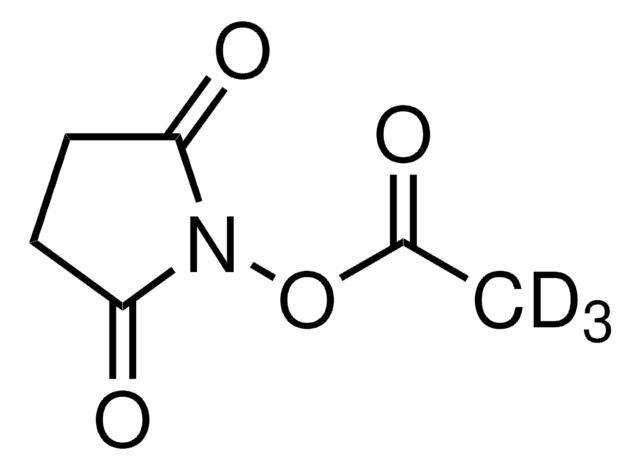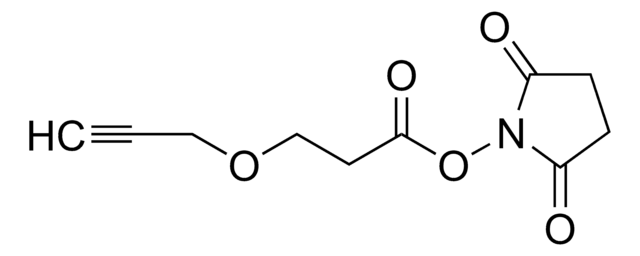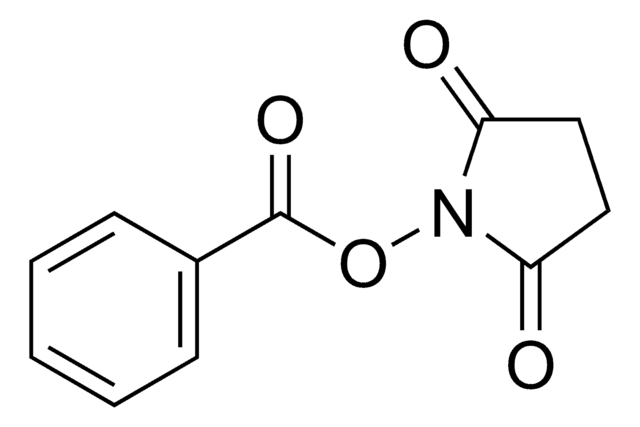93535
N-(Propionyloxy)succinimide
for LC-MS derivatization, LiChropur™, ≥95% (HPLC)
Synonym(s):
1-(1-Oxopropoxy)-2,5-pyrrolidinedione, 2,5-Dioxopyrrolidin-1-yl-propanoate, Propanoic acid-NHS ester, Propionyl-Osu, Succinimidyl propionate
Sign Into View Organizational & Contract Pricing
All Photos(1)
About This Item
Empirical Formula (Hill Notation):
C7H9NO4
CAS Number:
Molecular Weight:
171.15
MDL number:
UNSPSC Code:
41116105
NACRES:
NA.22
Recommended Products
Quality Level
Assay
≥95% (HPLC)
form
solid
quality
LiChropur™
for LC-MS derivatization
reaction suitability
reagent type: derivatization reagent
reaction type: Acylations
technique(s)
LC/MS: suitable
SMILES string
O=C(CCC1=O)N1OC(CC)=O
InChI
1S/C7H9NO4/c1-2-7(11)12-8-5(9)3-4-6(8)10/h2-4H2,1H3
InChI key
AASBXERNXVFUEJ-UHFFFAOYSA-N
General description
N-(Propionyloxy)succinimide is commonly used as a mobile phase additive in liquid chromatography-mass spectrometry (LC-MS) and its typical application involves the derivatization of histones. It involves the following properties:
- Extensive QC testing ensures the highest specifications.
- Optimized to improve ionization and resolution.
- Extremely low levels of inorganic and organic impurities.
- Manufactured specifically for accurate and fast LC-MS.
Legal Information
LiChropur is a trademark of Merck KGaA, Darmstadt, Germany
related product
Product No.
Description
Pricing
Storage Class Code
11 - Combustible Solids
WGK
WGK 3
Flash Point(F)
Not applicable
Flash Point(C)
Not applicable
Choose from one of the most recent versions:
Already Own This Product?
Find documentation for the products that you have recently purchased in the Document Library.
Customers Also Viewed
Masaru Fujimoto et al.
Proceedings of the National Academy of Sciences of the United States of America, 117(40), 25150-25158 (2020-09-25)
The plasma membrane (PM) acts as the interface between intra- and extracellular environments and exhibits a tightly regulated molecular composition. The composition and amount of PM proteins are regulated by balancing endocytic and exocytic trafficking in a cargo-specific manner, according
Yoko Inai et al.
Biochimica et biophysica acta. General subjects, 1864(8), 129632-129632 (2020-05-18)
Mindin (spondin2), a secretory protein related to neural development and immunity, is a member of thrombospondin type I repeat (TSR) superfamily proteins, and has a unique glycosylation of C-mannosylation in its structure. However, it remains unclear whether C-mannosylation plays a
Zhenfeng Zhang et al.
mBio, 11(3) (2020-06-11)
Archaeal chromatin proteins Cren7 and Sul7d from Sulfolobus are DNA benders. To better understand their architectural roles in chromosomal DNA organization, we analyzed DNA compaction by Cren7 and Sis7d, a Sul7d family member, from Sulfolobus islandicus at the single-molecule (SM)
Yea Lu Tay et al.
Scientific reports, 9(1), 19757-19757 (2019-12-26)
Mitragyna speciosa Korth (M. speciosa) has been widely used as a recreational product, however, there are growing concerns on the abuse potentials and toxicity of the plant. Several poisoning and fatal cases involving kratom and mitragynine have been reported but
Adriana Ordóñez et al.
Cell reports, 35(7), 109144-109144 (2021-05-20)
Circulating polymers of α1-antitrypsin (α1AT) are neutrophil chemo-attractants and contribute to inflammation, yet cellular factors affecting their secretion remain obscure. We report on a genome-wide CRISPR-Cas9 screen for genes affecting trafficking of polymerogenic α1ATH334D. A CRISPR enrichment approach based on
Our team of scientists has experience in all areas of research including Life Science, Material Science, Chemical Synthesis, Chromatography, Analytical and many others.
Contact Technical Service










